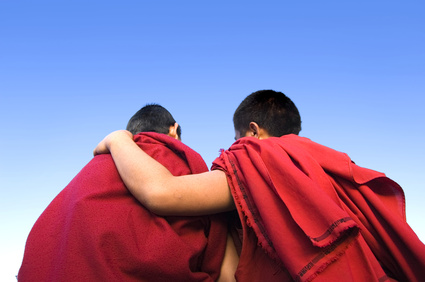
To really benefit from a teacher or coach, you need to be able to give them your trust. Not everyone deserves that gift. But sometimes it’s hard to tell the difference between form and substance. And when you are in pain or personal crisis, you could be willing to try anything.
Here are some our ideas about what to look for in a teacher or coach (and how to be a good one):
They help you to become more powerful, rather than fostering dependency. There’s a subtle trap that healers can fall into: They need you to be sick in order for them to have someone to heal. This is why we don’t believe in people being “patients”. We don’t believe in the sick role because we know that everyone is powerful.
They know that you are the expert in what you need. You don’t need any more people in your life telling you what to do. This is the trap of the expert role. It’s an “I know something you don’t know” or even “I’m the boss of you” attitude. That’s arrogant; It’s condescending. And it’s controlling. But don’t think it’s always obvious. Well-meaning people can fall into this trap when you ask them to make decisions for you. Don’t do that.
They know they’re a piece of God, but they also know that they’re not the whole enchilada. Steer clear of anyone who wants you to worship them. Remember the first commandment – Thou shalt have no other God before me – and choose a teacher who wants to create leaders, not devotees.
They can make a mistake. Beware of people who are too holy. We already mentioned the teachers who encourage you to worship them – the ones who create a holy hierarchy with them at the top. But there’s another type of phony holy – the hypocrites. The ones who don’t practice what they preach.
On this subject, you might want to read a book called Meeting the Shadow. It explores, for example, the achievements and the death of Chogyam Trungpa. Trungpa Rinpoche started over 100 Meditation Centers including the Shambhala Meditation Centers and Retreats and he founded Naropa Institute, the first accredited Buddhist University in North America. He also died, at the age of 48, from complications of alcoholism (as well as cocaine and Seconal).
The problem is not that he was fallible – The problem was that his secrets and hypocrisy were an abuse of power and a betrayal of trust.
You feel safe with them. Avoid a teacher who evokes fear. This often shows up in the message that there’s only one Way and you’ll suffer if you don’t follow (their interpretation) of it. But leading by fear can also come in the form of criticism, disapproval, and group pressure to conform. It is thinly disguised in the teaching to “accept 100% responsibility” that really delivers blame. Listen to your inner guidance system and don’t allow anyone to lead you with fear (or anger or intimidation).
They encourage your growth. The first time Charles went to India to see Sathya Sai Baba, the people who led the group were upset that Charles and Sai Baba formed a bond. They said to Charles, “If Sai Baba is your spiritual teacher now, who are we to you?” We didn’t hang out with them too long after that.
You want a coach or teacher who loves it when you find a whole truckload of supports, resources, and tools. They get a thrill from your path of exploration and discovery. They’re not competing with anybody else and they’re not competing with you. They’re not jealous. They celebrate when you’re happy. They don’t own you, and – as much as they love you and care about you – they don’t need you.
They help you problem solve. We’ve seen therapists and gurus who are completely non-directive. It’s the opposite of the expert role, but it’s still a kind of condescension, like they’re above it all and they’re just waiting for it to dawn on you that the solution to every problem is to transcend it. Stuff matters! If you’re hurting, it matters to you. Find a teacher who shows compassion and will actually give you constructive suggestions. They don’t drown in your pain but they don’t just sit in the I.T. (the Ivory Tower) either.
Most of the cautions about teachers boil down to someone having a “Big Me – little you” attitude or trying to possess you. Don’t buy it. Give your trust to people who respect you and can help you to find the best in yourself.
VERY GOOD – WRITE UP ON THIS SUBJECT- SENSI AL McKAY
Pingback: Listen to your body | kaichido.com